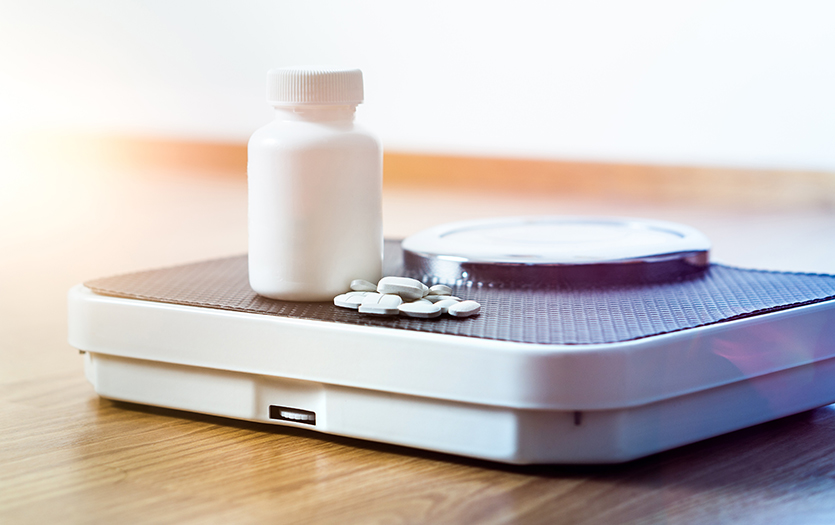
This post was written by Corey Uetrecht, PharmD, Parkview Health.
More than two-thirds of adults in the United States are overweight or have obesity. Many experts say that the best way to lose and keep weight off is by making lifestyle changes such as following a balanced diet and being active daily. While these steps have proven effective for many, they can also be difficult to sustain. This challenge has prompted some people to explore over-the-counter weight loss products, known as dietary supplements, to help support their efforts. This post outlines key information about these options, including their potential effectiveness, benefits and risks.
The basics
Before using dietary supplements, it is essential to understand their risks and limitations. Unlike over-the-counter drugs and prescription medications from the pharmacy, dietary supplements are not regulated by the Food and Drug Administration (FDA) and do not undergo the rigorous FDA approval process. Manufacturers are responsible for ensuring product safety but are not required to demonstrate the claimed benefits. Because these products are not tested for effectiveness, it is best to be cautious when using them. Dietary supplements can be expensive and might interact with other prescription medications that you are taking. Anyone considering a weight loss supplement should discuss the risks and benefits with their primary care physician or pharmacist before starting.
FDA approved medications
Some weight management aids have been approved by the FDA for their efficacy in weight loss. However, Alli™ (Orlistat) is the only medication available both over the counter and as a prescription drug. It works by reducing the absorption of some fats from the foods consumed. The unabsorbed fats are then eliminated from the body through the stool. The over-the-counter dose is 60 mg, taken three times daily with a meal that includes fat sources like avocado, fish, nuts, eggs or cheese. Common reported side effects of this drug include abdominal pain or diarrhea.
Other FDA-approved weight loss medications require a prescription and target weight loss through appetite suppression or changes in digestion. These include:
-
Qsymia™ (Phentermine-topiramate): It works by decreasing appetite and must be used along with a reduced-calorie diet and exercise plan.
-
Contrave™ (Naltrexone-bupropion): These medications work together on two areas of the brain, the hunger center and the reward system, to reduce appetite and help control cravings.
-
Saxenda™ (Liraglutide): It aids the pancreas in releasing insulin when blood sugar is high, slows stomach emptying and reduces appetite which can lead to weight loss.
-
Wegovy™ and Ozempic™ (Semaglutide): This medication also helps the pancreas to release insulin when blood sugar levels are high, slows digestion and reduces appetite.
-
Zepbound™ and Mounjaro™ (Tirzepatide): These prescription drugs increase the availability of insulin and decrease glucagon, a hormone that controls the amount of glucose produced by the liver in the body. They also slow digestion and reduce appetite.
Supplements with evidence of effectiveness
Several dietary supplements have shown moderate effectiveness in weight reduction when paired with calorie reduction and lifestyle changes. These supplements may work through mechanisms such as appetite suppression, metabolism-boosting or improving digestion. Below is a list of dietary supplements that have demonstrated some effectiveness in the reduction of obesity:
-
-
It has been studied as a component of green tea the most.
-
It has proven to be safe in doses less than 400 mg daily. Anything more than this can cause irregular heart rhythms or sleep disturbances.
-
Use caution when taken with pseudoephedrine (Sudafed) because it will increase heart rate.
-
-
Chitosan
-
A long sugar derived from the exoskeletons of various arthropods.
-
A dose of 1-3 grams daily for up to 1 year has shown a moderate reduction in weight loss, but only when combined with a calorie reduction.
-
It could cause constipation or diarrhea.
-
Supplements with little to no efficacy
Many popular dietary supplements lack substantial evidence for their effectiveness in weight loss. Below is a list of popular dietary supplements that have either not been studied or have not shown effectiveness in providing weight loss:
-
Apple cider vinegar: Long-term use could cause low potassium.
-
Berberine: Referred to as a "natural GLP-1" but the results remain inconclusive.
-
Chromium: Some evidence of weight gain has been shown, but results are conflicting.
-
Psyllium: Reliable source of fiber but has shown little improvement in weight loss.
-
Garcinia cambogia: Avoid if also taking aspirin or a prescription "blood thinner" like Eliquis™ (apixaban) or Xarelto™ (rivaroxaban)
-
Glucomannan: Slight weight loss has been shown for 3-5 grams daily for up to 3 months.
-
Green tea: Most instances of weight loss have been linked to the caffeine or catechin portion of green tea.
-
Guar gum: Current research available shows no improvement in body weight.
-
Probiotics: May benefit insulin and cholesterol levels but show limited weight loss effects.
Final thoughts
While some dietary supplements may help with weight loss, they often only provide a small effect, especially in the absence of lifestyle changes. It is also important to consider the potential side effects or interactions that these may have with other medications. For questions regarding dietary supplements or weight loss aids, Parkview Outpatient Pharmacies are here to help. We are committed to exceptional service and work directly with your doctor to ensure medication appropriateness and safety. Contact your preferred Parkview outpatient pharmacy, and our staff will gladly assist you with questions or prescription transfers.



